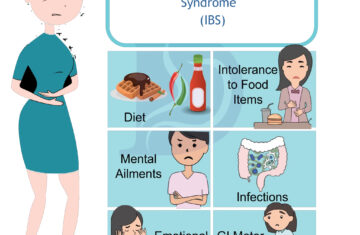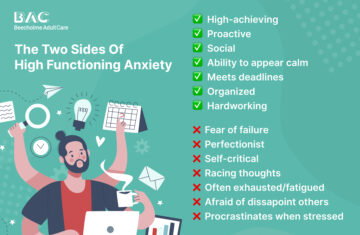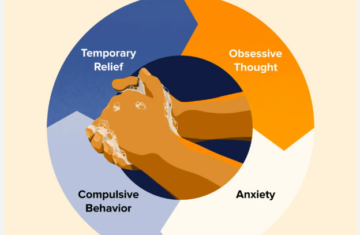
Depression can often be brought on by life stress, or by a sudden loss, such as relationship breakdown or the loss of a job. It is characterised by low mood, pessimistic thoughts, hopelessness, poor sleep and the thought that life is not worth living. People with depression are often also anxious; they can feel restless and irritable, worried that they have too much to do but unable to settle to any task. They may also feel so low and unable to do anything that they stay in bed and stop doing even the smallest tasks.
Research has shown that depressed people suffer from negative and pessimistic thoughts. They often feel that they are bad or worthless, that their situation is hopeless and that the future will be worse. This can make it difficult to tackle any task because one feels that one will not be successful. For example, many sufferers will not open their post or will put off the simples household chores. At the same time, sufferers feel too low and pessimistic to enjoy themselves.
Here are some steps to consider if you’re thinking about seeking counseling for depression:
-
Recognize the Signs: It’s important to recognize the symptoms of depression, which can include persistent feelings of sadness, hopelessness, loss of interest in activities, changes in appetite or sleep patterns, difficulty concentrating, and thoughts of self-harm or suicide.
-
Talk to a Medical Professional: Before seeking counseling, it’s a good idea to consult with a medical doctor or a psychiatrist. They can help determine if your symptoms are due to depression or another medical condition, and they can provide guidance on treatment options, which may include therapy, medication, or a combination of both.
-
Types of Counseling: There are various types of counseling or therapy that can be effective for treating depression. Some common approaches include Cognitive Behavioral Therapy (CBT), Dialectical Behavior Therapy (DBT), Psychodynamic Therapy, and Mindfulness-Based Therapy. Your therapist will help determine the best approach based on your individual needs.
-
Finding a Therapist: You can find therapists through various sources, such as online directories, recommendations from medical professionals, or referrals from friends and family. Make sure to look for licensed therapists who specialize in treating depression or mood disorders.
-
Assessment and Treatment Plan: Once you’ve chosen a therapist, your first sessions will likely involve an assessment of your symptoms, history, and current challenges. Together, you and your therapist will develop a treatment plan tailored to your needs and goals.
-
Consistency and Patience: Counseling is not a quick fix, and progress may take time. It’s important to attend your sessions consistently and actively engage in the therapeutic process. Be patient with yourself and your therapist as you work through your challenges.
-
Open Communication: Building a trusting and open relationship with your therapist is crucial. Be honest about your thoughts, feelings, and experiences so that your therapist can provide the most effective support.
CBT for Depression
As in all CBT, therapy begins with a Formulation, which is developed in collaboration between patient and therapist. The formulation helps both patient and therapist to understand what has caused the depression and what is maintaining it.
One part of Cognitive-Behavioural Therapy can involve Behavioural Activation, which involves helping the depressed person to begin a programme of more positive activities. Initially, the therapist may ask the sufferer to keep an Activity Schedule, to see what activities are most helpful in raising their mood. Exercise, even very moderate exercise can be very helpful, and activity also helps the sufferer to feel that he or she is achieving something.
Therapists will often ask patients to keep records of their thoughts, especially those thoughts that seem to trigger changes in mood. Thought Records are used to understand what negative thoughts are important in maintaining the depression, and therapy can help patients to take a fresh look at these thoughts.
Depression can begin to lift after a few sessions of CBT. As the client’s mood improves, patient and therapist can look at long-term factors that might cause depression to recur as well as client strengths and ways of preventing relapse.
Important
Remember, seeking help for depression is a sign of strength, and you don’t have to go through it alone. If you’re in crisis or experiencing thoughts of self-harm or suicide, it’s important to reach out to a mental health professional, a helpline, or an emergency service immediately.




